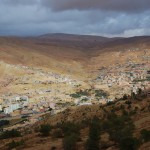Jordan
Jordan is a kingdom in South-East Asia. The full name of the country is the Hashemite Kingdom of Jordan. The name Hashemite testifies about the Jordan ruling dynasty originating from the descendants of Prophet Muhammad.
The state originally called Emirate of Transjordan was founded by Great Britain in 1921 as a semi-autonomous territory as part of the territory of Palestine, which was under British mandate.
On May 25, 1946, independent Kingdom of Transjordan was proclaimed and it signed an alliance treaty with Great Britain. In 1947, the UN voted for dividing Palestine into Jewish and Arab states, giving Jerusalem a special international status. This plan, however, was rejected by the Arabs. In 1948, in response to an attack of united military contingents of Egypt, Syria, Iraq, Lebanon and Transjordan, Israel captured Western Jerusalem, while Jordan troops occupied Eastern Jerusalem and the West Bank of the Jordan River.
On April 26 of 1949, the name of the country was changed to a new one — the Hashemite Kingdom of Jordan, while the Hashemite rule of both banks of the Jordan was legalized by the parliament in April of 1950. During a new war with Arab states in June of 1967, Israel seized Eastern Jerusalem and the West Bank. Jordan continued to claim the West Bank as its territory until July 31 of 1988, when in response to a mass upsurge of Palestinians and their requirement for self-determination King Hussein gave up claims for the West Bank.
In 1994, Jordan signed a peace treaty with Israel.
Jordan is the only Arab country, which is not located on the sea shore. Only the south-western end of Jordan 27 kilometers long is washed by the waters of the Gulf of Aqaba of the Red Sea. The only sea port of the country — Aqaba — is located there. In the north, the country borders Syria; in the east – Iraq and Saudi Arabia; in the west – Israel and the West Bank of the Jordan River.
The country’s territory is 89,206 sq. m. (after the exchange of territories with Saudi Arabia in 1965).
The population is 5.46 million people. The ethnic groups are: Arabs (60% of them – Palestinians with a lot of refuges) Circassians, Chechens and Armenians.
Language: Arabic, English.
Administrative division: Eight provinces.
Capital – Amman, population 1.7 million people.
The largest cities: ez-Zarqa, Irbid and Aqaba.
The state is a constitutional monarchy. Real legislative and executive power is in the hands of the king, who is the head of the state. According to Jordan’s constitution, legislative power belongs to the two-chamber parliament (National Assembly), and the king, who appoints members of the upper house called the Senate.
Executive power belongs to the king and the government, the head of which is appointed by the king and presents for his approval candidates of the members of his cabinet. The king has the legal right to dismiss the government.
Jordan is a Muslim country, and its many local traditions and customs are religiously tinted. Jordanians in their nature are very friendly and hospitable. Greeting and farewell are usually accompanied by hand shaking. The majority of gestures are made by right hand, since left hand is believed to be unclean. Food is offered and received also by only right hand. Jordanian speech etiquette does not differ much from the norms accepted in other Arab countries. But to a European, who is meeting Arabs for the first time, Orient greetings may seem to be somewhat extended.

